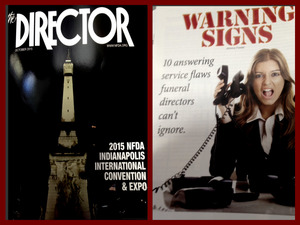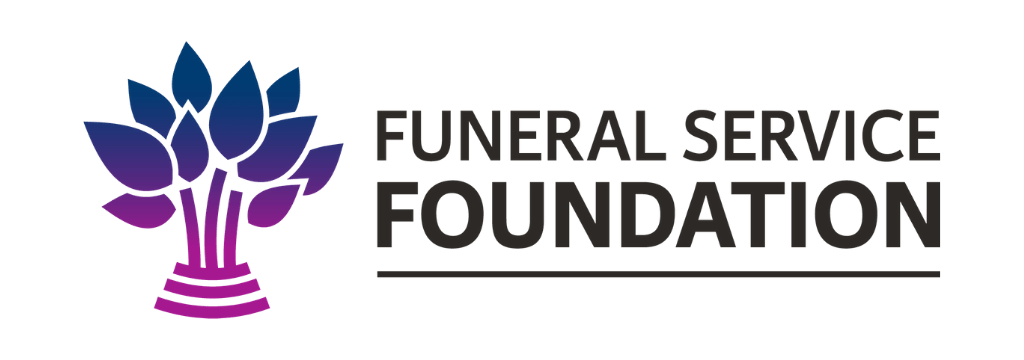Article: 10 Answering Service Flaws Funeral Directors Can’t Ignore
ASD Staff Writer, Jessica Fowler, was recently published in The Director Magazine, a publication of the NFDA. The article examines how funeral homes can evaluate their answering service to ensure they are properly representing their business and provides specific examples of issues that can arise when using a company that is not funeral-specific. It explains how funeral directors can be proactive in monitoring the performance of an answering service. For more articles from Jessica please visit the ASD-Answering Service for Directors blog
WARNING SIGNS: 10 Answering Service Flaws Funeral Directors Can’t Ignore
Many funeral homes have deep roots connecting them to their communities. After all, providing support to the neighborhood is the foundation of funeral service work. For this reason, some directors prefer to shop locally and work with those that live in their area. While this approach certainly makes sense for some business dealings, funeral directors must be cautious when hiring a local answering service to represent their firm.
If you are working with a local service, odds are good that the service also works with doctors, tow truck drivers and other businesses that require its services. Without the proper training and technology in place, however, a local, multi-profession answering service could cause a funeral home more harm than good by creating a negative first impression when dealing with your funeral home’s sensitive calls, including the risk of lost first calls.
Fortunately, there are several telltale signs that can help you identify when a local answering service is detrimental to your funeral home’s reputation. If calls are recorded by your service, listen carefully to how they are handled and pay close attention to these important warning signs. If calls are not recorded, this in and of itself should cause alarm. Even in this circumstance, though, you can still evaluate your answering service by using a mystery phone shopper company or calling your funeral home while lines are forwarded.
The Warning Signs
1. Those who answer don’t sound sympathetic
Many families feel very anxious and overwhelmed when reporting a loved one’s passing. These emotional calls must be handled with patience and understanding. Unfortunately, this is not always a top priority for generic answering services that do not have the proper training in place. Operators will switch back and forth between calls from doctors and other businesses, so when a death is reported, they often stumble over what to say. Human connections may be harder to make over the phone, but it is still possible to convey emotion with certain phrases and an empathetic tone of voice. An answering service representing a funeral home should understand the importance of providing compassion over the phone. Listen to your calls to evaluate your answering service’s tonality or call your funeral home while lines are forwarded and pose as a family member in need.
2. Before even asking the nature of the call, callers are encouraged to call back
If the first thing a caller hears when contacting your funeral home is what time they should call back, it is time to find a new answering service. Call centers that immediately rattle off the business office hours are essentially encouraging those with pricing or preneed questions to contact a different funeral home.
When a person calls a funeral home for the first time, it is likely he or she may have a tentative understanding of funeral procedures. Families may be hesitant to label their needs as important even after a death. If the service is not cognizant of your caller’s tonality and phrasing, it is very likely the operators will not recognize an urgent situation. In many cases, listening to the callers words – as well as what they don’t say – can make all the difference. Without proper training, unspoken clues such as a sharp intake of breath or delayed response are more likely to be overlooked. Instructing callers to phone back during office hours will only cement an impression in the person’s mind that the funeral home is not responsive to their needs.
3. Callers are placed on hold for long periods of time
For many people, contacting a funeral home is one of the most daunting tasks they will ever experience. The minutes between dialing the number and speaking to a funeral professional who can walk them through the process can feel endless. And while it may be customary for businesses like insurance companies and medical offices to place callers on hold for long periods of time, for funeral home callers, a few seconds can feel like a lifetime.
If callers to your firm are routinely put on hold by your answering service, they are likely to feel like a low priority. Poor customer service can be detrimental for a funeral home’s reputation. Bad word of mouth travels fast and statistics have proven most people will not wait on hold long before hanging up and calling elsewhere.
To determine the promptness of the answering service you employ, call your funeral home while lines are forwarded during different times of the day and see how long it takes for the line to be answered. Tip: When calling, use an unfamiliar number since some answering service systems will prioritize calls from their clients above normal inbound callers using Caller ID. This will help you to evaluate what your callers are experiencing when calling your funeral home after hours.
4. Callers are rushed off the phone
Local answering services that serve a large number of businesses often suffer from issues with long hold times. As a result, operators are very focused on answering as quickly as possible to reduce the number of incoming calls. When a person contacts your funeral home, they don’t expect someone who sounds distracted or rushed to answer the line. They don’t expect to be interrupted or to feel like a number instead of a person. Unfortunately, this can be a regular occurrence. For this reason, it’s very important to take time to listen to how your answering service is representing your business. There should never be any doubt that your callers are being treated with patience and understanding.
5. Information is not repeated back for accuracy
For most professions, an incorrect phone number, misspelled name or incomplete address is an irritating but relatively simple problem to fix. For funeral homes, however, even the smallest inaccuracies can cause a great deal of embarrassment. A director may not be able to reconnect with a family in need if the phone number transcribed by their answering service is incorrect. A relative is likely to feel highly insulted if a family name is spelled wrong in an obituary or on a death certificate. A removal may be delayed if a complete address is not obtained. Repeating information is a simple and effective way to avoid these uncomfortable situations while ensuring that crucial data is accurate. If your service is not verifying these details with callers, it is very likely that mistakes will occur.
6. Calls are not dispatched promptly or correctly
Consider for a moment how many time-sensitive calls your funeral home receives. In addition to at-need and preneed, directors receive a myriad of other urgent messages that must be handled immediately. When a pressing issue is communicated to your answering service, how quickly are you contacted with the message? Answering services that are understaffed or juggling calls for a large number of different businesses often have long delays when dispatching messages. Many have completely separated their inbound and outbound call centers, making it impossible for those dispatching messages to prioritize funeral home calls appropriately.
Even more problematic is when an answering service agent does not follow proper protocol and contacts the wrong person. When evaluating your firm’s answering service, be sure to carefully monitor the dispatch times. If your messages are consistently delayed, it may result in lost business, unfulfilled deadlines and other problems that can have a major impact on serving families and your bottom line.
7. Every call, even routine messages, are patched to your staff
Many funeral professionals utilize an answering service that can directly patch calls to the director on duty. While this is certainly a useful option for at-need and other urgent calls, the service should be capable of effectively screening your messages as well. Every funeral home is different and you should have the ability to customize what types of calls are directly patched to you. Not every message requires immediate attention. Your service should be able to document which calls you need patched directly and which calls can wait until the following business day.
8. There are frequent problems with sound quality
Voices in the background, static on the line, a distracting echo—these are a few signs that an answering service is utilizing outdated or unreliable telephone equipment. If a grieving family member cannot hear an operator at your answering service, it can cause a great deal of unnecessary frustration and confusion. Take time to do some test calls into your answering service and listen for these audio issues. If the company you are using has not invested in dependable technology, they should not be trusted with your sensitive calls.
9. They are often inundated with recorded solicitations
Funeral homes are often targets for recorded solicitations from telemarketers. These automated messages tend to target specific business professions with specific “sales pitches.” Most local answering services do not have the technology necessary to create defenses against a barrage of incoming spam calls. They cannot handle the sudden influx of telephone activity and as a result, critical calls are often delayed or disconnected. Find out from your answering service how often it is affected by these occurrences and whether the company has built any working solutions within its answering service system.
10. Quality of service is inconsistent
With the right training, most kind and compassionate people are capable of sensitively handling at-need calls. However, for a funeral home whose reputation is built on excellence, “most of the time” is not good enough. When evaluating your service, take note of the differences in expertise and skill level between operators answering calls to your firm. It may be true that your service employs some agents that are familiar with funeral home callers, but if you notice that other calls are mishandled then it is likely your answering service suffers from high turnover. Not too long ago there were over 10,000 answering services in North America. Today, there are fewer than a 1,000. It is very common for local answering services to change ownership without alerting clients of the change. When this occurs, there is always an uncomfortable transition period that detracts from the quality of service clients receive. Monitoring your calls on a regular basis ensures that your families always receive the same professional and consistent service every time they call.
Funeral Service Expertise vs. Local Knowledge
As members of their communities both personally and professionally, many business owners like to keep business dealings local as much as possible. But when it comes to trusting your funeral home’s reputation to an outside company, experience outweighs proximity. It won’t matter how familiar operators are with landmarks in your town if they are not acquainted with funeral customs and practices. There is little benefit to working with answering service agents that share an accent with you if their tone of voice is not also empathetic, patient and kind. This expertise can make all the difference when a family contacts a funeral home for the first time to report a death. A single mishandled call could damage a relationship your funeral home has had with a family for generations. Take proactive steps to avoid this by evaluating your service to ensure that it is professionally and compassionately representing your business.




